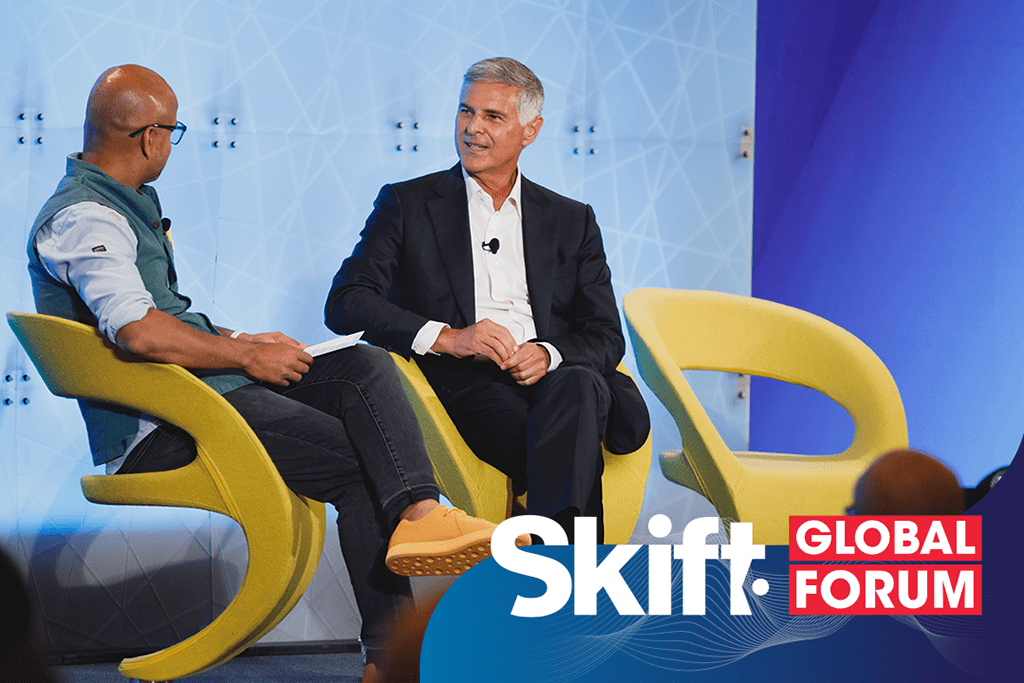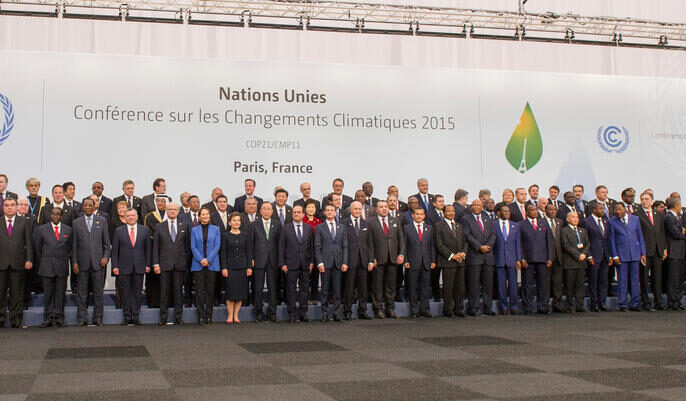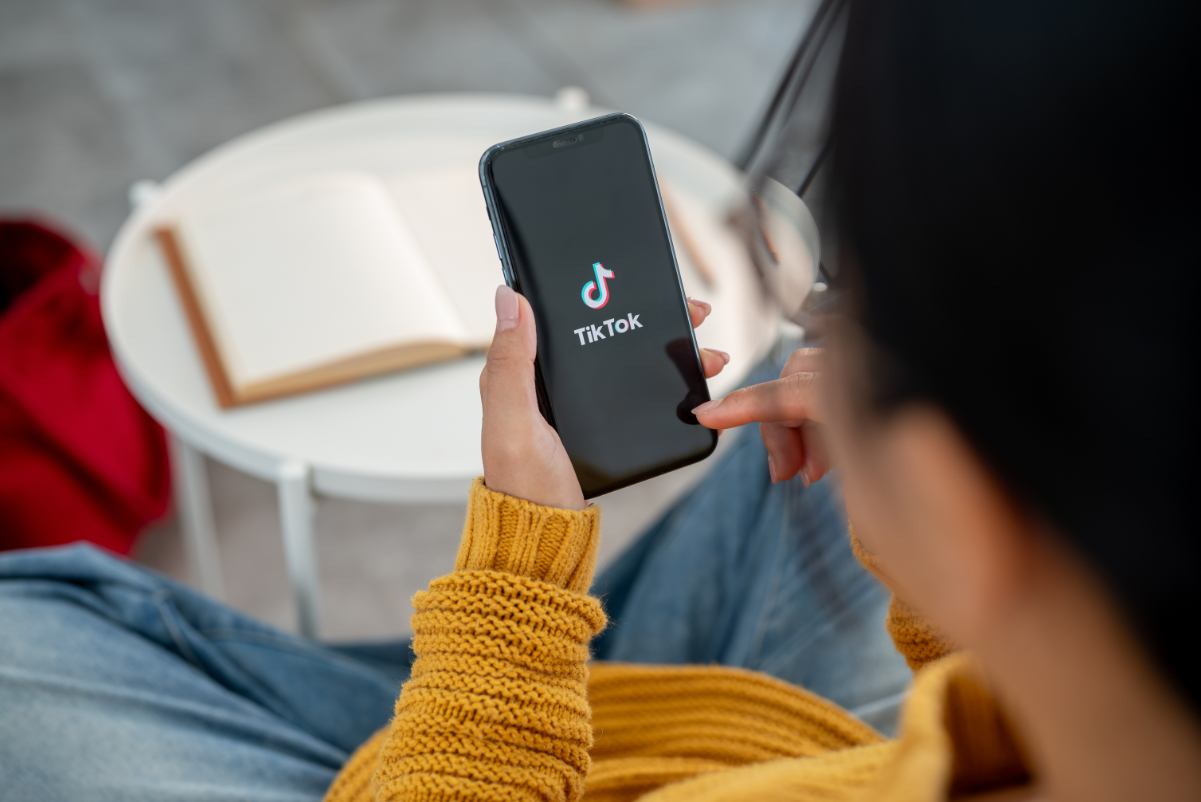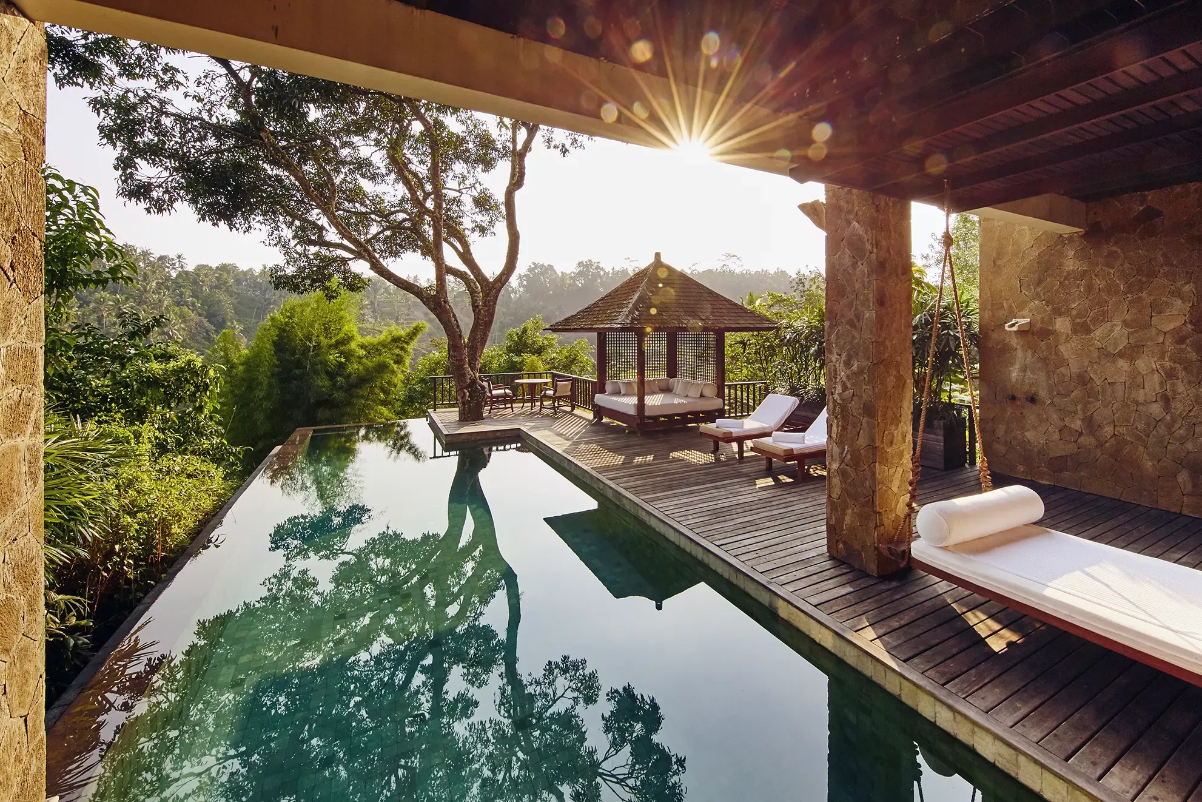Hilton CEO Christopher Nassetta at Skift Global Forum 2021

Skift Take
Hilton President and CEO Christopher Nassetta spoke with Skift CEO Rafat Ali at Skift Global Forum 2021. The two discussed the theme “How We Live and Work Has Changed for Good, Will Travel?”
You can watch a full video of their discussion as well as read a transcript of it, below.
Rafat Ali: Thank you, Chris, for being here.
Christopher Nassetta: Great to be with you. Before we get started, I did want to voice one small complaint or really a question for you. I want to know … I was here last in 2019. By the way, it's fabulous to see some … well, I can't say smiling faces because I can't see their mouths but nice to see a lot of people in the room. But did I do something wrong?
Ali: To be the last speaker of the day?
Nassetta: In 2019 to get the 5:30 p.m. slot? I mean, I would've asked you this backstage, but I thought it would be more interesting for everybody to hear this live.
Ali: Tell your team to renew their subscription to Skift Research, and then we will put you early in the day.
Nassetta: That's it?
Ali: That's the reason.
Nassetta: We didn't renew it? Oh my God.
Ali: No, no, you did. You did. Right, Carolyn, they renewed? I think they're all good.
Nassetta: All right. I guess I'll forgive you. We have some people here. I said to my team, "We're like, that's sort of a rule of thumb." You're between everybody and cocktail hour.
Ali: The good news is we're just going to relax and talk, and you're going to open up.
Nassetta: I love that. I'll tell you anything you want to know, all my innermost feelings.
Ali: Let's start with, obviously, the Delta variant, and I think in the (second quarter) earnings call you said you didn't factor it into your projections. Two weeks into September — I guess three weeks now — what's your feeling now? Has anything changed? Or you're seeing that sort of plateauing out and things coming back?
Nassetta: I would say, big picture, what I talked about on our second quarter call, which was very early in the Delta experience — and a bunch of things have changed, which I'll come back to. But big picture, what I talked about was my faith in the resilience of the business, (and) the underlying demand — both natural and pent-up demand in all segments. We obviously had seen that in leisure like crazy already, but we were really starting to see it in business travel. We were really starting to see it in the bookings on meetings and events, like these events.
My big picture view then was, listen, as we get towards the end of this year and end of next year — and COVID was still an issue and Delta was early — I think we are on a solid road to recovery. And I have every confidence that we're going to continue to see pickup in the segments that have been lagging, and that it was a natural consequence of not just a health issue but a recession that was brought on by a health issue.
I've been doing this for longer than I want to admit. But every time you're coming out of recession, we've seen leisure lead. Not quite by this measure, but generally, leisure leads, business travel, meetings and events follow. Over dependency of the next three or four quarters, my view then was I think we're going to get back to sorf of a place where we're pretty much where we were in (2019). Not in the full year like next year, but on a run rate basis. I would say — because you asked me a question, I will answer it — I don't really feel any differently today.
But if you then dive a little deeper into where we are at this exact moment relative to what I would've hoped for, then I'd say we're a little bit behind. It does not change my view on the broader trajectory. It does not change my view on what I think, on a run rate basis, we will achieve next year based on what's going on with Covid, and what I see in demand patterns and booking patterns.
It's impossible to be perfectly scientific. I think what we did is we inserted like four to eight weeks of going through this Delta spike that is — I think if you read all the data — (feeling) like it's sort of getting under control. As I go out and talk to customers, I mean, we finished the best leisure season we've ever had in 102 years, so that's pretty healthy.
Ali: This is just in the strength of the U.S. market?
Nassetta: We finished our best leisure season in the world but driven by the U.S. market. And we expected August to drop off in business travel. It always does, right? People do go on vacations — they don't travel for business. And it did, but not that much. Not a whole lot different than we expected, and post-Labor Day, it's picking back up — probably a little slow. If I were being really objective, I would've thought it would pick up a little bit faster. The slope would've been little bit steeper when I talked about it (in second quarter) than what we're seeing now, but it is in September.
As we get deeper into September, it is recovering. Meetings and events, as I said, it's wonderful to see all of you here. I mean, that is pushed out a little bit because it's easy for people to say, "Eh, I don't know. Should we do this event?" Big businesses are saying, "I don't want put people in harm's way," and they have risks of bad PR and all that. So that's getting pushed.
My view had been and remains that that's more of a — I mean, we'll get some fourth quarter meetings and events, more than we've had — but that's really a 2022 phenomenon. I think we inserted some number of weeks — maybe a couple months — but not much more than that. I think my fundamental optimism, which I think is well founded on data about sort of the trajectory of where we're going and how this will play out next year, is pretty much what it was.
Ali: I should obviously remind all of you or anybody who's watching online that we will have some time for questions, so go to the app and put your question in, and I'll get all these questions here. Hopefully, we will answer some of those if we have time. You have a contrarian view to the popular view on business travel.
Nassetta: Do I really? I mean, I don't know. Depends who you talk to, I guess. You've had a few people on stage.
Ali: Yeah, of course. Brian was here yesterday, and he thinks business travel is not going to …
Nassetta: ... supports their business model. I'll have a view, I guess, that'll support mine. But here's what I'd say. The way to think about business travel is in the end I think businesses need to travel. I mean, I run a big business, talk to a lot of people that do, and I can tell you pretty uniformly — regardless of what people say in Skift and everywhere else — the CEOs that are running the big businesses know they need to get people back together in offices more than they have. They know that they've got to get their people back on the road because they need to build culture. They need to build relationships. They need collaboration, they need innovation, culture building and all of those things are very, very hard to do digitally. I mean, listen, I've done more digital, virtual, Zoom and all that. I'm pretty advanced in that stuff.
Ali: Do you enjoy it?
Nassetta: No, I'm exhausted by it. My lower back can't take it anymore because I can't sit in one spot hunched over my iPad. I think the fundamental truth is this is a core part of doing business. It's really interesting to say you never travel and you'll cut back. And of course you will, because you've had to cut budgets back. That's normal in a recession, and I think it fundamentally will remain true and budgets increase until people have to deliver alpha. I think it's really great until you're competing on a deal and the other guys go out, they travel, and they have a dinner and they build a relationship, and you lose the business. It's a competitive world.
One thing, relationships matter, and you cannot build relationships the same way. Particularly, new relationships are almost impossible in that format. So my belief is business travel will recover. As sure as I'm sitting here, I'll pick a mark. Three years from now, business travel will be greater than it was in 2019. By the way, this summer — before the spike and Delta — it was 75 percent in our system of prior business transient. It was 75 percent of prior levels.
One of the things we do is we filter through our own world. What's happening is a massive bifurcation in business travel. Small and medium businesses are traveling a lot. Big businesses are not — because the risks, the budget cuts and all that. In our business — and we're second biggest, one of the biggest in the world — 80 percent of our business transient travel is small and medium businesses. We love the big businesses, too — for those of you that are out there — but it's the minority of our business.
Small and medium businesses don't have the luxury of saying, "Well, we're not going to travel." What's happening (is) I think we are now coming through a health crisis. And we are in a cyclical recovery of business travel because people clearly have cut budgets and all that. That's why I've said publicly dozens of times that ultimately, you have to go through a number of budget seasons to get that back.
The last thing I'd say, which we talked about in the back, is if you lift way, way up, right, and you go back over the history of time — whether it's leisure travel, business groups, meetings — the thing that's really driven travel is mobility. OK? Mobility, the demographics of middle classes growing, people wanting more experiences and things in the last 20 years.
In my own view, my opinion is that Covid ... those that think that sort of stopped all that are wrong. I think that it stopped it for a while because it had to kill mobility to tackle the problem. It actually reinforced all the reasons why people want more mobility and want more experiences, and they're going to have the disposable income to do it because the middle classes around the world are going to keep growing.
My underpinning on demand in our business, whether all segments, is you're going to be living in a world of greater mobility. Think about it. Even if like let's say … which I do think people are going to cut back office space needs. We probably will, right? We're going to be more efficient. We'll do hoteling, we'll do all sorts of things. What does that mean? It means more mobility. That means our people — they're not going to work from home. It's going to be work from anywhere.
What does that mean? They're going to need to travel more. They're going to work in hotels. They're going to need meeting spaces. They're going to have to come to the home office for a week a month just to do training or have some semblance of relationships. It means more mobility, more people moving. The more people move around the world for various reasons, the more we grow our business. That's the way it's been for 1,000 years, and that's the way it'll be for another thousand.
Ali: Well, last evening's whole theme was the future of human mobility, which the point was if the world's moves more — which certainly the wave of nationalism which is happening all around the world would make you think otherwise. But our speakers yesterday argued that that's a momentary phase, sort of the last gasp.
Nassetta: I agree. I think it's a fool's errand — not that I'm calling anybody that was here a fool — but I think broadly it's a fool's errand to trendline off of the bottom or the top or anywhere near the top. I mean, because when things are really great, we always trendline that, "Oh, my God, it's a new world order and everything's always going to be good." When things are really bad and you have these seismic things happening — which what's happened over the last year and a half's pretty seismic — we're human. We trendline. We filter for that and we trendline off of that. I think Bill Gates said this.
Ali: Recency bias, obviously, as well.
Nassetta: Yeah. We're factoring with a lot of bias. That's why I think you've got to sort of get through this. We can debate is more mobility going to be better for leisure, better for business (or( better for meetings. My view is it's going to be better for everything. Demand levels, when hopefully you invite me back in a better time slot next time, when I come back in three years for the first time slot — if I behave myself and we re-up our subscription or whatever we're supposed to do. I think we'll be saying, I'm hoping, and I think you'll tell me, "You were right. All your segments … like leisure went back, is probably a little bit greater than it was, but it's not what it is."
I mean, because people do go back to work, kids go back to school, and business travel and meetings and events have had a phenomenal run. Pent-up demand, people understanding more than ever that they need to build relationships, congregate, collaborate to be able to innovate and drive businesses, so we'll see. If you give me the right slot, we'll come back and you can hammer me if I'm wrong. But I would bet a lot of money. That's what history would say. I mean, it's a much more … not as major an event.
I mean, if you're here in New York, obviously it is, but 9/11. I remember in the days following 9/11, nobody was ever going to get on a plane. Why would you ever get on a plane in a world where you could fly into a building? I was there. I was running another big hotel company at that time, and it was like nobody would get on a plane. You woke up a year later, two years later, and we came up with coping mechanisms, (Transportation Security Administration), better security. Everybody was fine. Nobody was thinking twice about it.
Ali: Let me ask you this question.
Nassetta: People go back to patterns that are … you know, what Bill Gates famously said a while ago, that things change over the long term a lot more than people think. And over the short term, a lot less than people think. I share that philosophy — like don't trendline. Things aren't going back to where they were. I do think offices are going to be … I think a lot of things are going to be different. But underneath it all, mobility in the world's going to increase. It just has to. People want it, and they're going to get it. It's going to come in a bunch of different forms that is going to be good for our business.
Ali: Speaking of, obviously mobility, the travel industry got some great news this week with the U.S. borders reopening.
Nassetta: Yes.
Ali: One of my questions that I prepared last week for your team for you to answer was, to the Biden administration on opening international travel, what would you advise? I guess they took the advice before you gave them the advice.
Nassetta: They took the advice. Listen, as an industry, many people in this room and myself included have been working with the administration and both administrations. Yeah, obviously it hadn't been really ripe until we got enough shots in arms. The guy — the Covid czar I guess they call him, Covid coordinator for Biden — is a super close personal friend of mine, so I've been talking to him periodically throughout. I think, appropriately, their real thrust has been like, "We've got to deal with getting Americans vaccinated, and we don't want to enhance our risk by bringing anybody in that would slow down the trajectory of getting past Covid, particularly during the Delta wave."
You know, they've done a lot of work, we've done a lot of work, and we've been working with them to point out that you can do this safely. Just like we can all be here and we're vaccinated, so can international travelers come into our country with the right protocols, and we can do it safely in a way that's not going to change the risk profile for the country. I think we're at a point where, one, I think they agree with that. And importantly, we're not done, but they've got a lot of shots in arms. When we started talking to them four or five months ago or six months ago,
I mean, honestly, I think it was very hard to have a real conversation because they just hadn't gotten to the point of vaccination that they comfortable with. And they had a very myopic focus, as they should have, on that issue. So I applaud them for doing it. I think it's going to be great. Again, I think there's a ton of pent-up travel. I've been traveling a bit, wherever they'll take me. It's not that many places. I was in Europe a couple weeks ago for another conference, Alitalia. We had 800 or 900 people there.
It'll be great. It'll be great to get those travelers back and particularly for our cities. I mean, the reality is if you look at the data, if you look at our numbers, because nobody could leave this summer and all that, the numbers were great, as I was saying, because nobody left. They just they roamed about the country. A lot of drive-to vacations, and it was all pretty good. The cities, if you look at our system across the U.S. business system-wide, 5 percent of our business is international. Not that much, maybe four or five. If you look at the big cities, they're not all the same. But on average they're 20-plus. It's a big deal for the cities, to get the cities back on their feet. Obviously, the cities are lagging, the resorts.
Ali: Are you seeing any improvement? Like for instance, New York City?
Nassetta: Some. It's slow. I mean, as you would guess. I'd put it in three buckets, broadly: resorts, non-city everything else, and city. I'm grossly oversimplifying. The performance is in descending order of those buckets. The resorts have crushed it. We've had a big, steep slope in non-city everything else because of a lot of drive-to and drive-to business travel. And the cities have been bringing up the tail end. They don't have the international travel, the health issues, and more dense areas, more concerning, and we've had labor and lots of other things issues going on.
In the cities, I think it's just been a combo platter of things. Every city's a little bit different, but they've been lagging. But I this is going to help. It's going to help the cities in a big way. Yeah, every city's improving, it's just not as fast as everything else.
Ali: Speaking of resorts, how did you miss on that Apple Leisure Group deal?
Nassetta: You should ask Mark Hoplamazian. Is he speaking?
Ali: No. No, he's not here this year. Alex was going to be here.
Nassetta: Listen, we look at everything out there. We've obviously not been particularly acquisitive. I don't think that's a mystery.
Ali: Why is that?
Nassetta: It's very simple. We don't need to be. I mean, we look at the scale that we have, the network effect that we have as a result of our segmentation as a result of our geographic diversification, and then the product quality and consistency of service delivery. When we put the whole thing together, we've really created what we think is an industry-leading network effect. And I think we can demonstrate that by the fact that we have the highest market share of any of the major global branded players. I think that's pretty good evidence that it works.
When we look at (mergers and acquisitions), we look at it in the context that we have something that's working really well. We have opportunities to do more things. Since I've been at the company 14-plus years, we've doubled the size of the brand portfolio. We went from nine to eighteen brands, so it's not like we've been sitting around. We just did it organically. Why did we do it organically? Because we could develop brands that were purpose-built for exactly what we think the modern needs of a customer are. It's much higher return when we're not buying it and then spending our time fixing other people's problems, which invariably exist in that environment.
We look at everything. We looked at Apple. Literally anything that's traded, including Starwood back in the day when we were private, we've looked at. Some of those things we spent a lot of time on, but when we put it through a really simple filter of strategically, does it enhance our ability to deliver for customers what they want? And economically, is it really accretive to our shareholders as a result of doing it? Pretty much, so far. Nothing has made it through the filter. Now, at the same time, we've grown faster than everybody and we've done it organically, and the returns have been phenomenal, right? It was a big company when I got here. I think we've doubled the size of the company, doubled the size of the brands, and we haven't bought the first thing.
It's working, right? It doesn't mean on Skift or others that we're not going to be in the front page every day. But that's not what we're looking to do. We're looking to deliver the absolute most reliable, friendly experience for our customers and deliver the best returns for our shareholders. And I and we are maniacal about it, and that's why we do what we do.
Ali: Yeah. In terms of you talked about labor, and obviously this is a problem everybody's dealing with, I'm sure including you, probably. Is it, would it be fair to say, one of the top things on your mind?
Nassetta: Definitely. Definitely.
Ali: How do you solve it?
Nassetta: It's complicated. There's not one answer. I mean not one simple solution. I would say things are already happening that will help, but (it) will take time. I think when you look at the labor issue, I think if you think about how we went into Covid, certainly in some roles on the front line we already had pressure on labor, particularly in the area of housekeeping. But in other areas as well on the front line. They weren't extreme, but they existed. Then you went into Covid (and) you had health people not wanting to work because of their health issues. People didn't have anybody to take care of their kids. It's a very young workforce and they have children, elderly parents. They have childcare, adult care.
Then you had a number of things happen from a policy point of view, by the way, all of which I supported heavily. I would argue, in the beginning of the unemployment insurance from the federal government back in March and April of 2020, I was, I would argue, at the tip of the spear to be pushing for that. Over time, it had some impact in terms of when there was demand and when there were jobs available, it was not helpful, right. When you put all that together, government will pay me, I don't have anybody take care of my kids, I'm worried about my health, it's toxic. It's a toxic brew. Some of that is resolving itself. Unemployment has ended, the states there, the federal has ended. Almost all schools are open. We have ubiquitous access to vaccines. We'll see with the (Occupational Safety and Health Administration) stuff. Likely, eventually we'll have mandates.
Ali: Are you doing a mandate for your employees?
Nassetta: We have not. We are working with the rest of the industry to figure out what OSHA's doing exactly, and then we're going to make judgments. We've done it. We've mandated it in our corporate context, but we have not. We're waiting. As an industry, a number of us, we've all been talking. The last thing we want to do is come out with something, and then OSHA comes out with their (regulations) two weeks from now and it's something different. We're waiting. To finish the point on labor, some of those things are easing, so time is going to help us.
Then I think the greatest way that we help ourselves is we ultimately take great care of our people, and we have an incredible culture. No. 1 great place to work in the United States multiple years running, No. 2 in the world. That's because we pay well, we give great benefits. We create a family environment, where people want to be in it, and they tell their friends they want to be in it. And so ultimately, long-term, that's why we build a great culture, so we have the best talent that is inspired to serve our customers.
We're going to have to help it, beyond just going back to school and unemployment insurance, by figuring out more creative and innovative ways with the use of technology — which we're investing in, in scheduling, in access to flexible labor and gig labor in much more sophisticated ways, which we've been developing over the years for how we're training people. We realize that while we do this in a limited way — like where we have surge hiring in markets, resorts, different times a year — there are going to be a bunch of people that say like, "Maybe I don't want to work full time like I did ever again, or I can't because I've got child or family care of some sort, but I want to work a day or two a week."
We just have to — I think, and we are as a company — get much more sophisticated about how we do that, how we pay people, how they actually get paid physically, and using technology that is much more friendly and much more flexible, scheduling access to other pools of talent. We're in a process of doing a bunch of investing and thinking and actually action to get more access to labor.
Ali: Brian, can you put five more minutes in the clock? Sorry, just we're in a zone here. Let's do quick lightning rounds on a few things.
Nassetta: I'm not good at lightning, but yes, we'll try.
Ali: We'll try. Do you think that the housekeeping not being daily is permanent now in the industry?
Nassetta: Do I think it's what?
Ali: Housekeeping not being daily, meaning cleaning of the rooms.
Nassetta: Here's how I think about that. You guys, I don't think have done it, but a bunch of other press just got this wrong. My underlying philosophy — and I'm a zealot about this, and I have been for the entire time I've been at the company — is that our job is to deliver the most friendly (and), I said this, reliable experiences for customers. And the key way to do that is to give them choice and control, and to be able to do it at massive scale so that you effectively for — we serve 200 million people a year — can customize the experience at that level. Why? Because if we take the friction out, we allow them to get what they want, the way they want it, in the palm of their hand, like they have for most of the rest of their life, then they're going to be happy. It's going to be a better, more reliable and more friendly experience, and they're going to stay with us more and we're going to get a higher market share.
The answer to the question is what I think doesn't matter because it's an option for the customer. It's choice and control. Ultimately right now, we are working. It is not in our app, but it will be very soon. And it'll be super frictionless and super easy for people to say I want it or I don't. That's a good thing, because there are people (like) my wife — I found this out during Covid. I never knew this — (who don't) like housekeepers in the room in between stays. It was a huge epiphany. I said, "Are you kidding me? Why?" "Well, I don't know. I've got my stuff. It's all where I want it. They move my stuff around." I like it.
The truth of the matter is there are people on all sides of it. Part of it's Covid, and but part of it is just that some people don't want people in the room, and so we're not taking it away. We're just giving them choice and control. You have the choice and you control if you want it. We won't decide for you. Then think of that thematically in everything we do, right? The more we give people choices and make it super friction-free and give them the control in the palm of their hand, I think the better their stay is going to be.
Whether that's in-room technology with our smart room, whether that's the digital key that we led the industry in, and digital room selection ... Whether that's confirmed connecting rooms, which nobody, believe it or not, in the industry has but us. All of those things are choice and control. You can go on the app, you can get that, you can control it. If you don't want it, fine. Don't pop the button. If you want to create options, last I checked, optionality is a very powerful thing.
Ali: To your question on family travel. Why did it take until 2021 for one brand — only one brand, to launch that?
Nassetta: A funny story about it. We of course launched it this summer. I'll give you the answer. Within minutes of it going out, I got a picture of the headline and a text from my wife. She said, "Oh, this is really great. Now that our kids are grown up, you finally got off your you-know-what and did this." I was like, "Oh, great, thanks." Because my kids, I have six daughters. They're 18 to 28. She's like, "They don't want to be in connecting rooms anymore." I thought that was funny. It's like, "Yeah, sorry, sweetie. We couldn't get our act together." Listen, we're the only ones in the industry that have done it, so that should tell you something. It's not easy.
The reason isn't ... and this is what we've been working on for five years and we're at the very tail end, and we accelerated a lot of this work during Covid, ironically when a lot of people were cutting things ... is really just totally reimagining our tech stack. The reason all of these things are hard in the old hotel world is that you had these two monolithic, archaic systems that everybody has: PMS, property management (system), and CRS, (central) reservation systems. Let's be honest. They were old. While they worked, they were, I would argue, like shoestrings, bubblegum, duct tape. I mean, they just weren't built for the modern world.
You have such advances in technology. They weren't built for the kind of scale that we now operate in, the number of countries and all that. When you're these big companies, it's hard. You're flying. It's like taking a 747 over. You're trying to repair the engines, but you're in flight. You've got to make sure you keep the plane in the air. The industry broadly, I think, has been very slow on that.
About four or five years ago, we said, "We're getting out of that world. We're going to reimagine the whole thing. We're going to go open source, cloud-based microservices. We are going to have a tech stack that's as good as any of these startups that are out there in the tech world, because we have to, and we're just going to have to make the time and investment and manage our way through it." While we're not 100 percent of the way through it, our CRS is all done. Open source microservices, it's amazing. We can now atomize inventory. We could have like 26 room types. We can have a billion room types and we can do all sorts of really cool things. The PMS, probably by, realistically, middle to end of next year, will be pretty fully deployed. Then you put all that together.
In the meantime, we can do things now just by virtue of where we are. When we get all the way through it, it allows us to plug and play, from a microservices point of view, all sorts of interesting things like confirmed connecting rooms. We were able to do it in part because we've made enough progress to connect those dots. When we get probably a year from now, I think the opportunities are far, far greater. These are little things, I think.
Think about a world where you go on, and we can atomize our inventory for every single customer. We know that you want to be on a high floor, nowhere near the elevators, and you want a breakfast deal. And like we can put together literally an atomized package for your exact need and put it in front of you and charge appropriately, instead of making you work so hard to figure all these things out. The systems underneath it have to allow it, and so that's why it's taken so long. But we're almost there. I mean, we're there to be able to do a lot of it. We'll be fully there soon.
Ali: On that optimistic note, I do have 10 more questions, but we're really out of time.
Nassetta: Okay.
Ali: Thank you, Chris.
Nassetta: Yeah, we've got to let them go and have cocktails now.
Ali: I know. We really are ready for cocktails.
Nassetta: All right, so we have a deal? We'll kick it off?
Ali: We will, in 2022. Let's do that. Thank you again.





